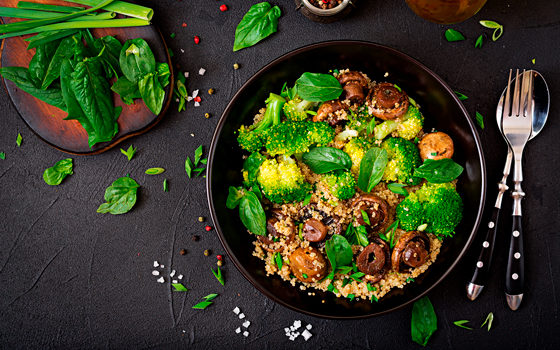A foodie by nature, I love exploring the various cooking trends and discovering new foods. Whether you’re a meat eater, flexitarian, vegetarian, vegan, or simply passionate about food, trying new ingredients is always satisfying and exciting!
Since vegan diets are becoming more and more popular, several new products are making it to our shelves. Over time, my pantry and fridge have filled up on these products and I’ve integrated them into my lifestyle! Here’s a quick look at my faves, which have made it easier for me to add the plant world to my table.
1: The traditional block of tofu (with a special mention for smoked tofu)
Affordable, versatile and convenient, tofu is on my weekly grocery list. I always have one (and sometimes two!) in my fridge. My weakness is smoked tofu: ready to use, I add it raw to my sandwiches or salads, or use it as a substitute for bacon, lardons or smoked Gouda in my “veganized” recipes.
2: Nutritional yeast
This is the star ingredient for giving your recipes a slightly cheesy taste. I use it in hummus, salad dressings, creamy sauces (that are traditionally cheesy), or I sprinkle it over popcorn and pasta. It contains 7–8 g of protein/tablespoon and is an excellent source of vitamin B12, a vitamin exclusive to the animal kingdom or else found in fortified products. Look for fortified products by checking the ingredient list, not the nutrition facts table. Vitamin B12 sometimes appears as “cyanocobalamin.”
3: Nut butters of all types!
Peanut butter is great, but how sad to limit yourself to it. The world of oilseeds is full of possibilities. Almond butter, pumpkin seed butter, cashew butter…Each variety offers its unique palette of taste and nutritional profile. I particularly enjoy tahini (sesame seed butter), which I add to my dressings, burger or sandwich toppings, and grilled veggies combined with a dash of soy sauce.
4: Jackfruit
This is the new kid on the block in the running with pulled pork! It can’t be compared to meat in terms of protein, but it can be a nice alternative to recreate the texture of pulled meat in some recipes. While rare, the whole fruit is available in some Asian grocery stores, but peeling and preparing it is tricky. I therefore suggest buying jackfruit in brine, sold at Rachelle Bery, available either plain or seasoned.
5: Tempeh
Still not as popular as the latest health trends including kale, tofu and quinoa, tempeh is definitely something to try! Used like firm tofu, it differs in the high bioavailability of nutritional elements as well as in its fibre content. You can sauté it and add to vegetable stir-frys, but it tastes especially good marinated and grilled and then added to veggie burgers!
6: De Puy lentils
I’m a legume fan in general; however, these little-known brown wonders are truly delicious and if you ask me, underused in relation to other legumes.
7: Mock cheeses (favourites: Zengarry mock cheeses)
Whether tofu, cashew, almond, or soy–based (and I’ve skipped a few), there exist a panoply of clever products out there to replace traditional cheeses. There’s a wide variety of mock cheeses on the market: wheels, logs, spreads, seasoned, firm, creamy, sliced, grated, to melt, etc. I do, however, have a soft spot for the Zengarry brand, which offers cashew-based mock cheeses that are simply delicious!
8: Flax seeds
Not surprising that flax seeds are on my list of faves! They have everything going for them! Plant-based and high in fibre and omega-3, they should be ground so the nutrients are better assimilated. They replace eggs in vegan recipes (15 mL [1 tbsp.] of ground flax seeds + 45 mL [3 tbsp.] water = 1 egg). From a nutritional standpoint, they closely resemble chia, but they have the added benefit of being farmed locally!
9: Gusta and Field Roast plant-based sausages
I’m not normally a fan of processed products, but these are especially interesting for their convenience and simple ingredient list. These products can be quite useful for people slowly transitioning to a vegan diet.
10: Fortified soy beverages
I’ve always got a soy beverage in the fridge or as backup in the pantry (aseptic cartons), more specifically in its unsweetened plain version. Since soy beverages are fortified and generally contain the same quantity of protein, calcium and vitamin D as cow’s milk, they offer an alternative comparable to traditional milk. I hope this list inspires you to add more plant-based products to your menu. With the population’s growing interest in a vegan lifestyle, I’m convinced that if our bodies, planet and animals could talk, they’d all echo back a great big thank you!
The team of dieticians at Rachelle Béry
Trending Now —

